选修六Unit 2 Reading
- 格式:ppt
- 大小:3.16 MB
- 文档页数:31

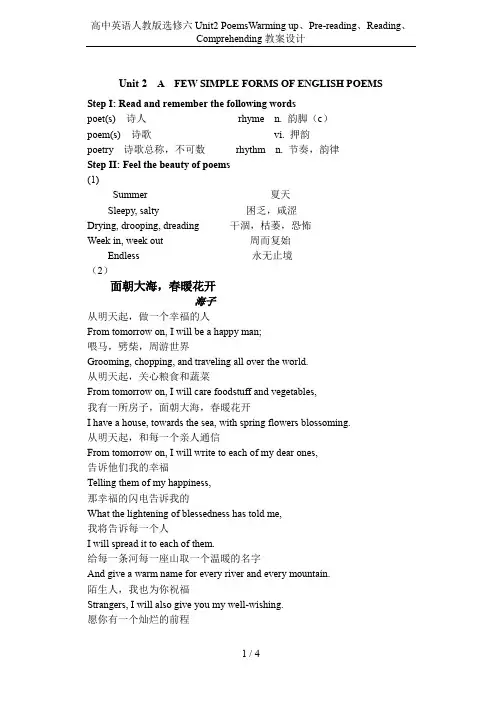
Unit 2 A FEW SIMPLE FORMS OF ENGLISH POEMSStep I: Read and remember the following wordspoet(s) 诗人rhyme n. 韵脚(c)poem(s) 诗歌vi. 押韵poetry 诗歌总称,不可数rhythm n. 节奏,韵律Step II: Feel the beauty of poems(1)Summer 夏天Sleepy, salty 困乏,咸涩Drying, drooping, dreading 干涸,枯萎,恐怖Week in, week out 周而复始Endless 永无止境(2)面朝大海,春暖花开海子从明天起,做一个幸福的人From tomorrow on, I will be a happy man;喂马,劈柴,周游世界Grooming, chopping, and traveling all over the world.从明天起,关心粮食和蔬菜From tomorrow on, I will care foodstuff and vegetables,我有一所房子,面朝大海,春暖花开I have a house, towards the sea, with spring flowers blossoming.从明天起,和每一个亲人通信From tomorrow on, I will write to each of my dear ones,告诉他们我的幸福Telling them of my happiness,那幸福的闪电告诉我的What the lightening of blessedness has told me,我将告诉每一个人I will spread it to each of them.给每一条河每一座山取一个温暖的名字And give a warm name for every river and every mountain.陌生人,我也为你祝福Strangers, I will also give you my well-wishing.愿你有一个灿烂的前程May you have a brilliant future!愿你有情人终成眷属May you lovers eventually become spouse!愿你在尘世获得幸福May you enjoy happiness in this earthly world!我只愿面朝大海,春暖花开I only wish to face the sea, with spring flowers blossoming.(3)望夫石唐王健望夫处,江悠悠。
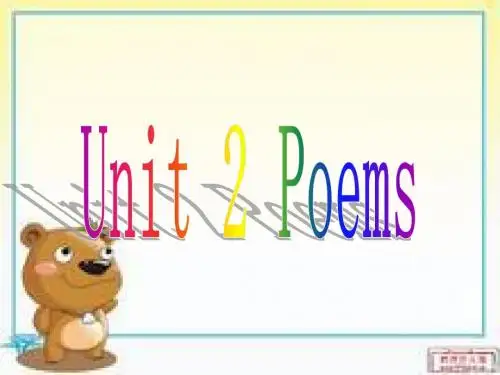
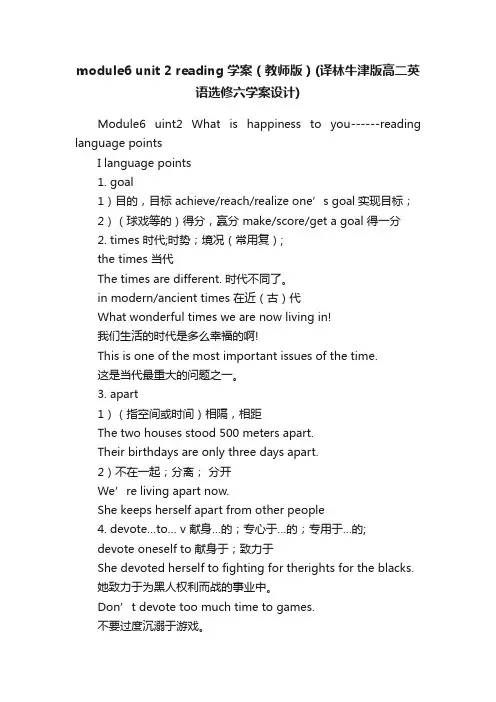
module6 unit 2 reading 学案(教师版)(译林牛津版高二英语选修六学案设计)Module6 uint2 What is happiness to you------reading language pointsI language points1. goal1)目的,目标achieve/reach/realize one’s goal实现目标;2)(球戏等的)得分,赢分 make/score/get a goal 得一分2. times 时代;时势;境况(常用复);the times 当代The times are different. 时代不同了。
in modern/ancient times 在近(古)代What wonderful times we are now living in!我们生活的时代是多么幸福的啊!This is one of the most important issues of the time.这是当代最重大的问题之一。
3. apart1)(指空间或时间)相隔,相距The two houses stood 500 meters apart.Their birthdays are only three days apart.2)不在一起;分离;分开We’re living apart now.She keeps herself apart from other people4. devote…to… v 献身…的;专心于…的;专用于…的;devote oneself to 献身于;致力于She devoted herself to fighting for therights for the blacks.她致力于为黑人权利而战的事业中。
Don’t devote too much time to games.不要过度沉溺于游戏。
devoted adj 挚爱的;忠诚的;全心全意的She devoted herself to her children. = She was devoted to her children.5.cost 使丧失;使损失That one mistake almost cost him his life.The closure of the factory will cost 1,000 jobs.The accident cost me a visit to the doctor.Financial worries cost her many sleepless nights.她为钱发愁,许多夜晚无法入睡。
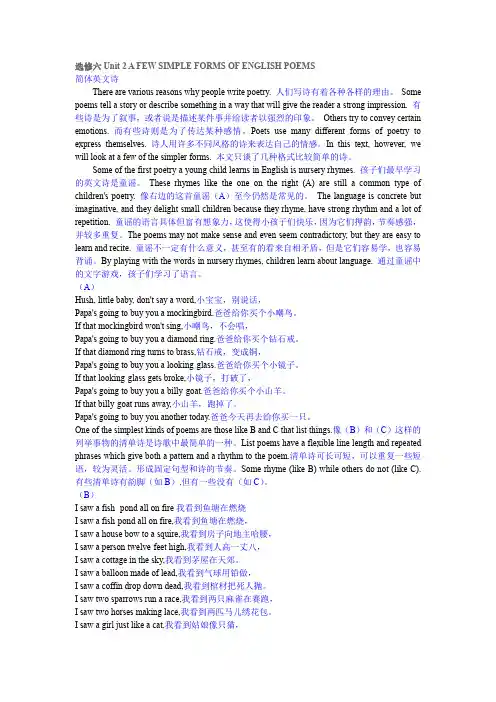
选修六Unit 2 A FEW SIMPLE FORMS OF ENGLISH POEMS简体英文诗There are various reasons why people write poetry. 人们写诗有着各种各样的理由。
Some poems tell a story or describe something in a way that will give the reader a strong impression. 有些诗是为了叙事,或者说是描述某件事并给读者以强烈的印象。
Others try to convey certain emotions. 而有些诗则是为了传达某种感情。
Poets use many different forms of poetry to express themselves. 诗人用许多不同风格的诗来表达自己的情感。
In this text, however, we will look at a few of the simpler forms. 本文只谈了几种格式比较简单的诗。
Some of the first poetry a young child learns in English is nursery rhymes. 孩子们最早学习的英文诗是童谣。
These rhymes like the one on the right (A) are still a common type of children's poetry. 像右边的这首童谣(A)至今仍然是常见的。
The language is concrete but imaginative, and they delight small children because they rhyme, have strong rhythm and a lot of repetition. 童谣的语言具体但富有想象力,这使得小孩子们快乐,因为它们押韵,节奏感强,并较多重复。

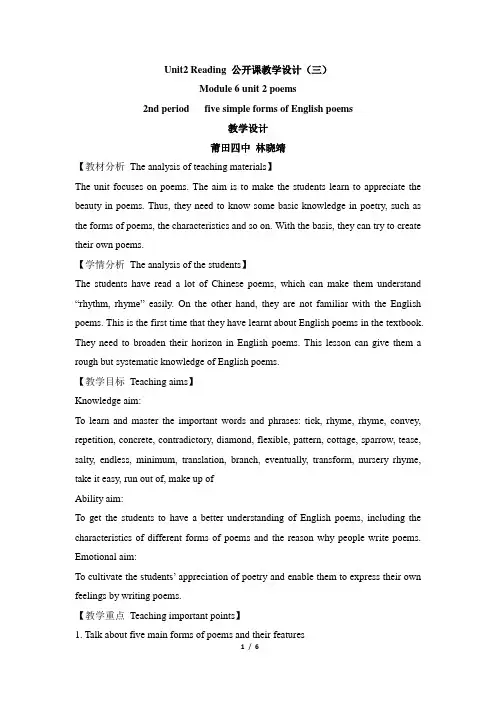
Unit2 Reading 公开课教学设计(三)Module 6 unit 2 poems2nd period five simple forms of English poems教学设计莆田四中林晓靖【教材分析The analysis of teaching materials】The unit focuses on poems. The aim is to make the students learn to appreciate the beauty in poems. Thus, they need to know some basic knowledge in poetry, such as the forms of poems, the characteristics and so on. With the basis, they can try to create their own poems.【学情分析The analysis of the students】The students have read a lot of Chinese poems, which can make them understand “rhythm,rhyme”easily. On the other hand, they are not familiar with the English poems. This is the first time that they have learnt about English poems in the textbook. They need to broaden their horizon in English poems. This lesson can give them a rough but systematic knowledge of English poems.【教学目标Teaching aims】Knowledge aim:To learn and master the important words and phrases: tick, rhyme, rhyme, convey, repetition, concrete, contradictory, diamond, flexible, pattern, cottage, sparrow, tease, salty, endless, minimum, translation, branch, eventually, transform, nursery rhyme, take it easy, run out of, make up ofAbility aim:To get the students to have a better understanding of English poems, including the characteristics of different forms of poems and the reason why people write poems. Emotional aim:To cultivate the students’ appreciation of poetry and enable them to express their own feelings by writing poems.【教学重点Teaching important points】1. Talk about five main forms of poems and their features2. Understand the main purpose of writing poems.【教学难点Teaching difficult points】1. Analysis the features of different forms of poems.2. To enable the students to create their own poems.【教学方法Teaching methods】Discussion and cooperation【教学工具Teaching tools】Multimedia. Chalk and blackboard【教学过程Teaching procedures】Step 1 Lead-in1. Enjoy a nursery rhyme “twinkle” to find some features of nursery rhymes.Q: This is a nursery rhyme. It’s also a form of poems. Do you think it’s easy to learn and recite? Why?A: Nursery rhymes feature in rhyme, repetition, and strong rhythm, through which we can get a feel for the poem’s sound.2. some tips about how to read a poem.get a feel for its sound (esp. rhyme /rhythm/repetition)get a closer understanding of what the poem is trying to convey.(theme)设计说明:这样的导入紧扣主题,通过让学生听并跟唱一首耳熟能详的英文诗,激发学生的求知欲和好奇心,并教会学生应从哪些方面去欣赏诗歌,为下一步的诗歌教学作了很好的铺垫。
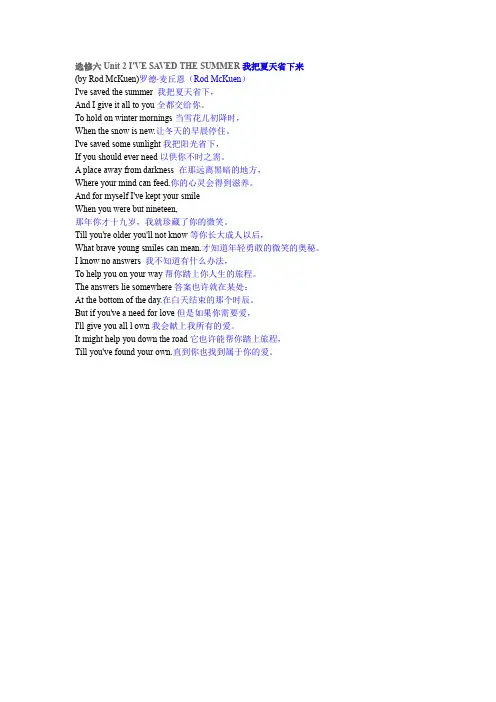
选修六Unit 2 I'VE SA VED THE SUMMER我把夏天省下来(by Rod McKuen)罗德·麦丘恩(Rod McKuen)I've saved the summer 我把夏天省下,And I give it all to you全都交给你。
To hold on winter mornings当雪花儿初降时,When the snow is new.让冬天的早晨停住。
I've saved some sunlight我把阳光省下,If you should ever need以供你不时之需。
A place away from darkness 在那远离黑暗的地方,Where your mind can feed.你的心灵会得到滋养。
And for myself I've kept your smileWhen you were but nineteen,那年你才十九岁,我就珍藏了你的微笑。
Till you're older you'll not know等你长大成人以后,What brave young smiles can mean.才知道年轻勇敢的微笑的奥秘。
I know no answers 我不知道有什么办法,To help you on your way帮你踏上你人生的旅程。
The answers lie somewhere答案也许就在某处:At the bottom of the day.在白天结束的那个时辰。
But if you've a need for love但是如果你需要爱,I'll give you all l own我会献上我所有的爱。
It might help you down the road它也许能帮你踏上旅程,Till you've found your own.直到你也找到属于你的爱。
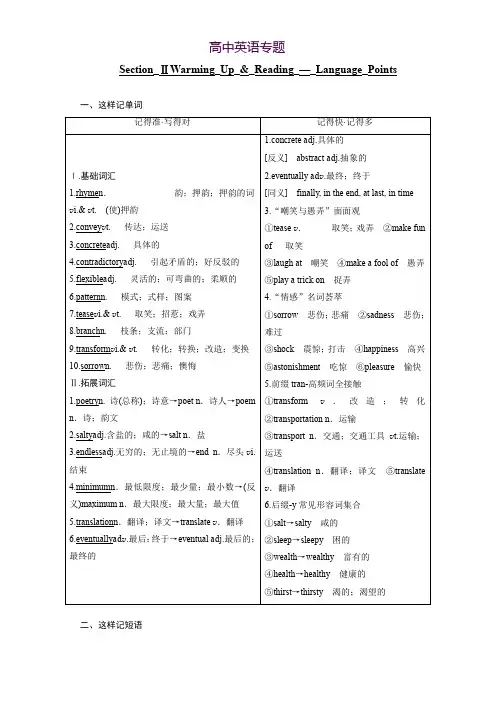
Section_ⅡWarming_Up_&_Reading_—_Language_Points 一、这样记单词二、这样记短语三、这样记句式1.(教材P10)Others try to convey certain emotions.而有些(诗)则试图传达某种感情。
convey vt.传达;运送请向你的妻子转达我的谢意。
②His determined look conveyed (convey) his meaning that all the injured should be conveyed from the spot to the hospital at once.他坚定的表情表达了他的想法:所有的伤员应该立即从现场转移到医院。
2.(教材P10)List poems have a flexible line length and repeated phrases which give both a pattern and a rhythm to the poem.清单诗可长可短较为灵活且有重复的短语,这就形成了这种诗的固定句型和节奏。
flexible adj.灵活的;可弯曲的;柔顺的这个月,我的日程安排有很大的灵活性。
②The company appreciates a more_flexible design.这家公司喜欢更灵活的设计。
③Leather and rubber are flexible, while glass and iron are not.皮革和橡胶都是易弯曲的,而玻璃和铁则不然。
④Computers offer a much greater degree of flexibility (flexible) in the way work is organized.利用计算机,工作安排可以灵活得多。
3.(教材P10)... if we hadn't taken it easy.……如果我们没有放松警惕。
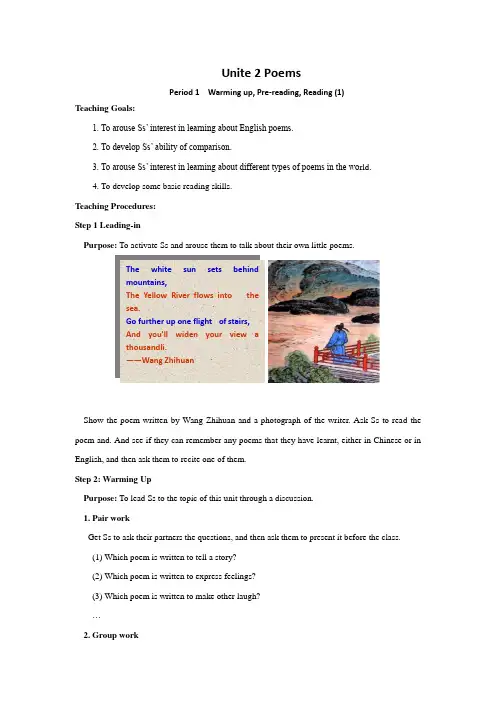
Unite 2 PoemsPeriod 1 Warming up, Pre-reading, Reading (1)Teaching Goals:1. To arouse Ss’ interest in learning about English poems.2. To develop Ss’ ability of comparison.3. To arouse Ss’ interest in learning about different types of poems in the wo rld.4. To develop some basic reading skills.Teaching Procedures:Step 1 Leading-inPurpose: To activate Ss and arouse them to talk about their own little poems.The white sun sets behindmountains,The Yellow River flows into thesea.Go further up one flight of stairs,And you'll widen your view athousandli.——Wang ZhihuanShow the poem written by Wang Zhihuan and a photograph of the writer. Ask Ss to read the poem and. And see if they can remember any poems that they have learnt, either in Chinese or in English, and then ask them to recite one of them.Step 2: Warming UpPurpose: To lead Ss to the topic of this unit through a discussion.1. Pair workGet Ss to ask their partners the questions, and then ask them to present it before the class.(1) Which poem is written to tell a story?(2) Which poem is written to express feelings?(3) Which poem is written to make other laugh?…2. Group workGet Ss to talk about the world famous poets. The pictures below can be used for Ss to talk about, and Ss can also talk as much as they can.William Shakespeare George Gordon Byron Li Bai威廉·莎士比亚乔治·戈登·拜伦李白(1) William Shakespeare: English playwright and poet whose body of works is consideredthe greatest in English literature. His plays, many of which wereperformed at the Globe Theatre in London, include historical works,such as Richard II, comedies, including Much Ado about Nothing andAs You Like It, and tragedies, such as Hamlet, Othello, and KingLear. He also composed 154 sonnets. The earliest collected edition ofhis plays, the First Folio, contained 36 plays and was publishedposthumously (1623).(2) George Gordon Byron: British poet acclaimed as one of the leading figures of theRomantic Movement. The Byronic hero lonely, rebellious, andbrooding first appeared in Manfred (1817). Among his other works areChilde Harold (1812-1818), The Prisoner of Chilton (1816), and theepic satire Don Juan (1819-1824). Byron was notorious for his loveaffairs and unconventional lifestyle. He died while working to secureGreek independence from the Turks.(3) Li Bai: Chinese poet who spent much of his time wandering and composingromantic, wine-inspired verse.Conclusion: All these poets are well known to the whole world and do you know any poems written by them? Can you recite to all the class?Step 3. Pre-readingPurpose: To help Ss learn about the context of the Reading part.1. Group workAsk Ss to discuss the questions with their partners in groups of four.(1) Do you have a favorite poem in Chinese?(2) Why is it your favorite poem?(3) Do you have a favorite poem in English?(4) Why is it your favorite poem?For example:(1) My favorite poem in Chinese is: 去年今日此门中,人面桃花相映红。
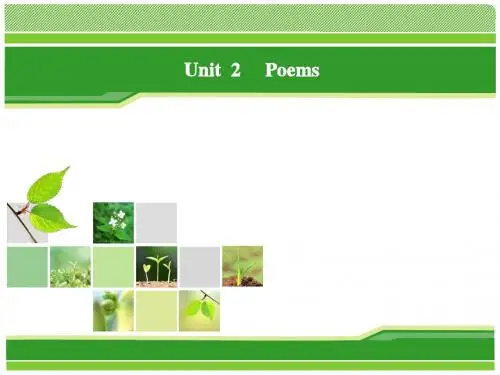
Unit 2 What is happiness to you?ReadingTeaching goals 教学目标1. Target language 目标语言a. 重点词汇和短语injure, struggle, in hospital, apart from, devote oneself to, rush, cheer up, overcome, accomplish, in good spirits, adapt, inspire, across the worldb. 重点句子Now, she finds happiness, through reaching much smaller goals, and through the love of the people around her.In 1998, a small accident during one of her practice vaults at the Goodwill Games could have cost her future happiness.She was rushed to a top hospital in New York and specialists from many parts of the world said that because of her severe injuries, she would never walk again.Everyone who saw her, from nurses to famous visitors like Leonardo DiCaprio from the film Tinatanic, who went to see her in the hospital to cheer her up, all said she was in good spirits. 2. Ability goals 能力目标Enable the students to talk about the story about Sang Lan and learn how to read an interview.3. Learning ability goals 学能目标Help the students learn how to talk about disabled people who have got great achievement and also how to read an interview.Teaching important and difficult points 教学重难点Talk about Sang Lan’s story and how to read an interview.Teaching methods 教学方法Fast reading, careful reading, and discussion.Teaching aids 教具准备A tape recorder and a multimedia.Teaching procedures and ways 教学过程与方式Step ⅠGreetings and Lead-inGreet the stude nts as usual and get them to review what they have talked about in the last period.T: Do you remember what we talked about last time?Ss: Yes. We talked about happiness and how to become happy by discussing six pictures.T: Yes, that’s it. Usually, we become unhappy because of this or that, and can cheer up again with the help of our friends or parents. But have you ever thought about the disabled?S: They suffer a lot both physically and mentally.S: I think it is very difficult for them to do things.S: We should help them.…T: Quite right! However, there are many disabled people, who defeated unexpected difficulties and succeeded finally and set good examples to us. Can you give me some examples?S: Sima Qian in western Han Dynasty composed Shih Chi.S: Sun Zi, whose feet were cut, wrote the Art of War.S: Hellen Keller, who lost eyesight and hearing, entered Harvard and Cambridge to study and became a great writer and educator.[:学&科&网Z&X&X&K]…T: Well done! All these people encourage us so much. And if you suffered from what they had experienced, what would you do?S: I would push for success.S: I would do something I can to make my life colourful.S: I wanted to learn something.S: I would do something to help others. I always believe helping others can make us happy.T: Great! All of you hold positive attitudes towards this. And today we will read an interview. The main character in the interview is Sang Lan. Do you know anything about her?S: I know she was once a gymnast.T: Yes, what’s more?S: She had an accident during one of her p ractice vaults and got injured severely.T: That is a shock to everyone. How did she overcome the difficulties, and how is she now? Let’s move to the text.Step ⅡFast-readingGet the students to read the text quickly and find out the answers to the questions in Part A. T: Now go through the text quickly, and answer the questions in Part A.A few minutes later.T: Now who would like to answer the questions?S: The topic of the TV interview is about the search for happiness.T: That’s right. Next question: What’s the name of the psychologist?S: The psychologist’s name is Dr. Brain.T: Good. The last question: When and where was Sang Lan born?S: She was born in Ningbo, China in 1981.Step ⅢCareful-readingGet the students to read the text carefully and learn more detailed information and then do Exercise C.T: You have done a very good job in answering the three questions. And now I will give you some more minutes to read the text carefully. Then try to do True or False questions in C1 on Page 20. If the statement is wrong, please try to correct it.Several minutes later, check the answers together.T: Excellent! You have done a very good job.Step ⅣPost-readingGet the students to do Exercises C2, D, E and F.T: Now you have got a better understanding of the text. Next, let’s do some exercises. First, ask the students to glance at Exercise C2 and D, the read Reading part again to finish them.Several minutes later. Check the answers together.T: Well done! Now let’s look at Exercise E. This is a newspaper article about Sang Lan. I will give you several minutes to complete the article.Several minutes later.T: Shall we check the answers now? I will ask some of you to read the article first.Ask some students to read the article and check the answers together.T: Well done! Next let’s talk about Exercise F in pairs, and la ter I’ll ask some of you to show us your dialogue. Are you clear?Ss: Yes!Give the students enough time to do that. Then check the answers.Sample dialogue:A: Have you ever heard about the story of Sang Lan?B: Yes, of course! She is very famous in gymnastics, which is a dangerous sport, only top athletes should be allowed to try the most difficult moves.A: Why do you think so?B: Because these athletes, who could be chosen to take part in the inter national games, must be talents in this field. They are trained professionally and practice almost day and night, bearing tiredness, hardship, and other things that we have never thought about.A: I do think so. But I also think that even though we can not be the top athletes in the world, training hard at a sport can make us more hard-working in other areas of our life.B: I can’t agree more. Training hard at a sport not only helps us build up our determination,challenge various difficulties bravely, and also helps us learn to collaborate with other team membe rs.A: Yes. From the story of Sang Lan, we can find that the sport spirit can help her hold a positive attitude towards her life and the world.B: So, she keeps busy and thin ks about positive things to enrich her life.A: By doing so, she will think little about herself and more about others. When she recalls all these meaningful things she has done, she’ll be very happy.B: Quite right!Step V Discussion[:学+科+网]Enable the students to talk about their experiences to overcome the difficulties and become ha ppy.T: Up to now, we have learned the story about Sang Lan and her struggle for happiness. And what can we learn from her? Next, combine your own experience and discuss the questions with your partners. I will give you some minutes to finish the task.Show the students the following questions.1. Have you ever had some painful experiences?2. If you have, how did you search for your happiness?Give the students some time to discuss the questions in groups of four.During this period, the teacher may go into the students to give them help if necessary. After several minutes, check the answers.T: Well, time is up. Have you finished the discussion?Ss: Yes.T: OK. I’ll ask some of you to tell your stories.S: When I was twelve years old, I had a bad accident. I was knocked over by a car. After two months of treatment, I was nearly recovered. But I couldn’t stand up easily. So I had to sit in the wheelchair. It was a shock to me. I was so afraid to become disabled. During that period of time, I felt very frustrated. Fortunately, my parents and m y friends gave me muchencouragement. They spared every free minute to stay with me and help me do exercise. Because of their encouragement and help, I cheered up again. I was determined to stand up again. Now I am as healthy as the others. After that experience, I realised that be optimistic, and everything will become better.T: Very good. You are brave. I believe in the future nothing will stop you. You will have a bright future.S2: To me, the most painful experience was the first month in the school. My home is far from here, so I had to be in residence(住校). I could meet my parents once a week. I felt so lonely. Everything was new to me. In that month, my study fell behind sharply. However, I thought, I couldn’t be like that any more. My aim was to get further education, not to miss my parents. So I concentrated on study. In my spare time, I tried to tal k with my classmates and made friends with them. Everything became better an d better afterwards.S: The painful experience I had was my failure in one exam. I had never failed in any exams before. That time I felt frustrated and even lost heart in my study. After a talk with my teacher, I realized: No pains, no gains. I looked back upon my attitude towards study before. Even the easiest things will become hard for you if you don’t try. So now I try my best to do everything. The results turn out that my effort is not in vain. I feel satisfied and happy.T: Good! You have expressed yourselves very clearly.Step ⅥText analysisHelp the students learn something about interview.T: The text we learned today is an interview. Can you tell me how to read an interview?S: First I will get the topic of the interview. And then I will read the questions and answers carefully.T: Good! Let’s read a reading strategy to know how to read an interview. Please open your books to Page 19.After several minutes.T: Can you tell me what an interview is?S: An interview takes place when one pe rson asks another person a series of questions on a topic.T: When reading an interview, what is important for us to do?S: It is important to carefully scan the first paragraph to find out the topic of the interview. T: What should we do after that?[:学.科.网]S: Then we should carefully read each question and try to fully understand the question before reading the interviewee’s response.T: If we want to get a better understanding of the topic, what should we do?S: We should pay special attention to the answer to the question.T: Thank you, very good. In this class, we learned Sang Lan’s search for happiness and we also learned how to read an interview. Everyone did a very good job. Class is over.Step ⅦHomework1. Remember the new words and expressions.2. Retell the text.。
选修六unit2知识点选修六 Unit 2 知识点一、重点词汇1、 convey释义:传达;运送;表达例句:Poems can convey certain emotions(诗歌能够传达某些情感。
)用法:convey sth to sb 向某人传达某事2、 concrete释义:具体的;混凝土制的例句:Can you give me a concrete example?(你能给我一个具体的例子吗?)用法:concrete evidence 具体的证据3、 contradictory释义:相互矛盾的;对立的例句:The two statements are contradictory(这两种说法相互矛盾。
)用法:be contradictory to 与相矛盾4、 flexible释义:灵活的;可弯曲的;有弹性的例句:We need a more flexible schedule(我们需要一个更灵活的时间表。
)用法:be flexible in 在方面灵活5、 pattern释义:模式;图案;式样例句:This dress has a beautiful pattern(这件连衣裙有一个漂亮的图案。
)用法:a pattern of 的模式6、 tease释义:取笑;戏弄;招惹例句:Don't tease him about his weight(别拿他的体重开玩笑。
)用法:tease sb about sth 拿某事取笑某人7、 transform释义:转换;改变;改造例句:The old factory was transformed into an art gallery(那家旧工厂被改造成了一个美术馆。
)用法:transform sth into sth 把某物变成某物8、 appropriate释义:适当的;恰当的例句:This dress is appropriate for the occasion(这件连衣裙适合这个场合。